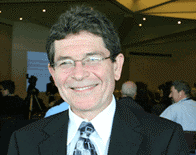The Second Australian Conference on Spirituality and Health encouraged health professionals to discuss their patients’ spiritual beliefs and to pray with them if patients asked.
More than 300 health professionals, academics and pastoral workers attended the conference initiated and organised by the South Australian branch of Adventist Health. It was held in late August at the Festival Theatre in Adelaide.
“Physicians should take the spiritual history of their patients and identify their spiritual needs,” says Professor Harold G. Koenig, founder of the Centre for the Study of Religion/Spirituality and Health at Duke University Medical Centre, North Carolina, and an international leader in research on Religion/Spirituality and Health.
Professor Koenig emphasised that physicians need to refer patients to those trained to address the spiritual issues, and not attempt to do it themselves. However, they should support and accommodate their patients’ spiritual beliefs unless it is unhealthy.
“Research among oncology patients show a significant improvement in their conditions after three weeks when doctors take nothing more than five minutes to understand the spiritual history of their patients,” says Professor Koenig. “We are just beginning to understand its impact on a patients’ ability to cope and their physical health.”
However, Professor Koenig reminded health professionals that they should not be pushing their own spiritual beliefs unto their patients.
Although majority of the delegates came from Australia, some also came from countries including USA, New Zealand, Iran and Fiji. Delegates comprised of students, academics, health professionals, chaplains and church leaders, and represented a range of denominations and faiths.
Speakers such as Ms Nada Roude, a cultural and religious diversity consultant, shared the Islamic faith with the delegates while Mr Alwin Chong from the Aboriginal Health Council of South Australia (SA) helped health practitioners understand Aboriginal spirituality in order to integrate it with the western medical model to get the best health outcome.
Seventh-day Adventist speakers such as Professors Carla Gober and Gerald Winslow from Loma Linda University in USA and Professor John Quin from Sydney also gave talks on religion, spirituality and health practices.
“The Seventh-day Adventist Church is a denomination with a huge emphasis on health, but with no voice on the links between spirituality and health,” says Mr Jonathan Duffy, director of Adventist Health in the South Pacific. “It is good to be seen as leaders and perhaps shapers in this debate now. It is an opportunity for us to shape the debate about what constitutes spirituality.”
According to Mr Marek Jantos, director of the South Australian branch of Adventist Health, the conference has enabled the Adventist Church to establish its presence among professionals and the academic community. People have also realised and acknowledged that the church is taking the initiative to bring people together to explore links between spirituality and health.
“They have developed an appreciation of the origins of our health principles and philosophies, of the wholeness towards health that we advocate,” he says. “We have also been able to direct discussions in relation to spirituality and health according to our philosophy.”
The Third Australian Conference on Spirituality and Health will be held in Adelaide, on 13-15 July 2009. The conference in 2009 will focus on integrating spirituality in the practice of health care.
The worldwide Adventist Church has made many contributions to health and wholeness through its extensive medical ministry, operating 167 hospitals and sanitariums and more than 450 clinics worldwide. The church's Loma Linda University Medical Center (LLUMC) is world-famous for its heart transplant program and the newly developed but already highly effective Proton Treatment Center which uses high-speed protons to attack a number of cancers with greater precision than traditional treatments. [Editor Melody Tan and Christian B. Schaeffler for SPD/APD]

